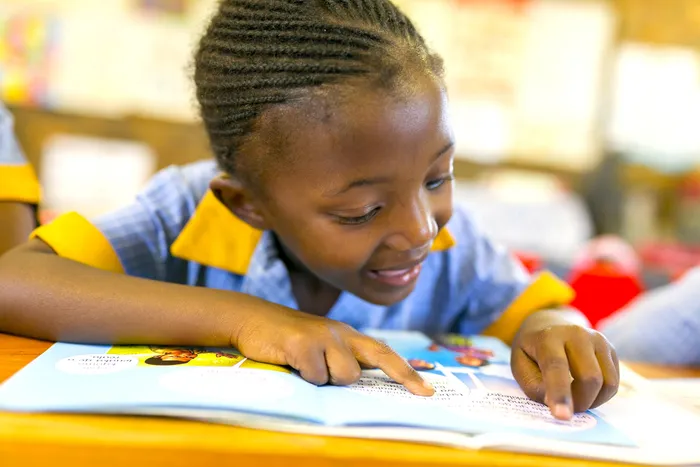Literacy project pioneered in Durban

The improvement of literacy at South African schools takes on a new urgency with a new programme to support principals, teachers and pupils.
Image: Supplied
In a vibrant Grade 3 classroom at Maqadini Primary, in KwaMashu, a wave of enthusiasm fills the air as pupils recite phonics poems in unison. For many, this marks a pivotal moment in their educational journey as they proudly sound out words for the first time, guided by their dedicated Education Assistant.
Principal Bonisiwe Mkhize reflects on the transformation: “This used to be the quiet class. Now, you can hear them practising their reading from the corridor.”
Maqadini Primary is one of ten schools participating in the Leaders for Literacy programme, a collaborative initiative involving the Citizen Leader Lab, Khanyisa Inanda Seminary Community Projects (KICP), and the FEM Education Foundation. The project is committed to tackling literacy challenges in South Africa by merging leadership development, teacher training, and pupil support within a cohesive school improvement model.
As the country grapples with alarming literacy rates - highlighted by the 2021 PIRLS study indicating that 81% of Grade 4 learners cannot read for meaning - the programme is a timely lifeline in the educational landscape.
Since inception, it has shown promising results. Within five months, principals are stepping into leadership roles with renewed confidence, teachers are honing their pedagogical skills, and classrooms are becoming increasingly well-resourced.
Unlike traditional programmes that primarily focus on pupil outcomes, Leaders for Literacy prioritises the empowerment of principals. They engage in leadership coaching, interactive workshops, and peer-learning circles under the guidance of Citizen Leader Lab's Leaders for Education initiative. This approach not only enhances management skills, but fosters an inspiring environment where teachers and parents feel encouraged to actively support literacy initiatives.
For Principal Celumusa Radebe of Vezamafa Primary, this new leadership perspective has been a revelation. “It’s not just about managing a school, it’s about leading people: teachers, learners, and parents with purpose,” he says, emphasising the necessity of strong leadership in educational success.
The ripple effect of this leadership-first philosophy is evident at Uthando Public Primary, where Principal Lindelani Ngcongo has launched monthly “family forums”. These gatherings invite parents to engage directly with their children’s education, leading by example. “We’ve learned that parental involvement is critical,” he says. “When the community believes in literacy, pupils start believing too.”
With school leaders casting a vision for success, the onus shifts to teachers to make that vision a reality. KICP’s Foundational Learning Programme is equipping foundation-phase teachers with practical, evidence-based literacy strategies. Workshops focus on enhancing reading and spelling skills while skilfully incorporating isiZulu and English. The training also encompasses supporting neurodiverse pupils and creating engaging, pupil-centric lessons.
Mrs Zulu, a Grade 2 teacher at Maqadini Primary, says her pupils have progressed remarkably: “Before, we didn’t always know how to reach the pupils who fell behind. Now we have strategies, resources, and extra hands in the classroom. You can see the change in us and in the children.”
One pupil, who once struggled to hold a pencil correctly, is now joyfully writing full sentences, thanks to innovative activities that build fine motor skills.
Every participating school has an Education Assistant (EA), trained to work closely with teachers and pupils. They facilitate small reading circles, providing essential remedial support and enriching after-school programmes.
Nozipho Ngesi, an EA at Bhekilanga Primary, recalls the triumphant moment when a struggling child read a full sentence for the first time, exclaiming, “I can read!” along with tears of joy streaming down her face.
Despite the remarkable achievements, challenges loom large, with many schools experiencing high pupil-to-teacher ratios and fluctuations in educational staffing. There are significant pressures as some educational assistants are stretched to support multiple classes, underscoring the need for more resources as the programme expands.
Amid these challenges, there is a determined spirit among school leaders, teachers, and EAs.“We’re learning to adapt,” remarks Project Manager Constance Gumbo. “Sometimes we take the workshops to the schools instead of central venues. We work after hours. The commitment is there from everyone.”
The integrated approach has captured the attention of the KZN Department of Education, which has signed a Memorandum of Understanding with KICP to enhance teacher professional development across the district.